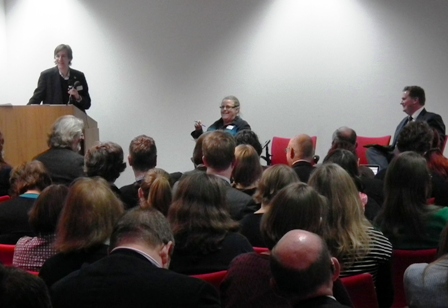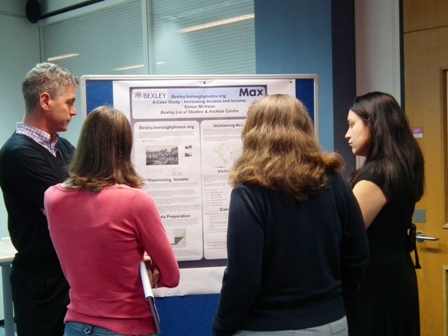
The packed Forum programme included plenary panel discussions
The National Archives was pleased to host the third annual Archives Discovery Forum on 7 March. The Forum brings together information and archives professionals from across the UK to talk about how to open up access to collections and information about collections. You can see the full programme on the UK Archives Discovery Network (UKAD) website. The Forum is a key part of the work of the UKAD network, to get people together and discussing progress in this area. That can be about major changes to standards affecting the sector internationally or about improving awareness of individual archives’ collections, and anything in between. We know not everyone in the sector is progressing at the same rate, but so long as everyone is going in the same direction, towards ever-broadening access, there is value in sharing our progress.
The event has over 20 speakers and multiple parallel sessions, so giving a flavour of the day is just that: a flavour! I didn’t want to bring you only my view, though. (I’m an incurable organiser, and part of my impression of any conference I’m supporting is always about moving chairs and refilling water jugs. Not to mention the horror of realising there’s no tea five minutes before the tea break – likely to spark a bloody revolution among the assembled archivists). So I’ve asked colleagues to help me to compile a mosaic of impressions of the day, augmented by examples from the #ukad twitter stream. Thanks for all your comments on the day.

The Forum is a way of making new contacts for future work, and we try to make networking fun!
What were people hearing and saying?
• Loving the big possibilities: the Google Cultural Institute and Wikipedia Commons (with a global monthly readership of 500 million!)
• Talk about “digestible narratives” to open up interest in collections: a lot of interest, but also some challenge (“Where does digestible narrative end and where does dumbing down commence?”).
• Archives are also artefacts: don’t be embarrassed to celebrate how good documents can look and how this attracts attention.
• The value of working with enthusiasts: promoting the Archives and Artefacts Study Network.
• “I’ve got a new fundraising strategy. I’m going to marry a Rothschild.” (Suspect that may be a very *old* strategy, says our tweeter.)
• Standing room only for the digital records discussion!
• “In the past, archivists have not defined archival description: it has defined us.”
• Advice from a small collection on profile-raising: “Get out there, be visible. Add value, hang around in the tea room and talk to people!”

A poster session towards the end of the day, allowing more projects to be highlighted
What were their key challenges?
• Can The National Archives build linked data on top of Discovery? (“The single most useful thing you could do for the sector is issue the National Register of Archives as linked data.”)
• “Google aren’t going to do it for us.”
• The tensions of “everything should be open” versus “what can we charge for” as income generation becomes increasingly essential to survival for many archives.
• Lack of standards in digitisation, especially standards for naming: storing up trouble and lack of searchability for the future
• “Online exhibitions are about showcasing, not comprehensiveness. Researchers always ask for comprehensiveness.”
• Consistently poor exported data is easier to improve through automation than inconsistently good. Standardisation is a big part of success with data exports, even if it’s a poor standard.
One message to take away?
• Start small, but do start! There are lots of tools put out there to support archive discovery: inertia is the hardest thing to fight. Not everything you experiment with will be successful, but think positive and push on with those that prove their value.
Slides and podcasts from the event will be available soon. Whether or not you were at the Discovery Forum this year, we’d love to use this post to collect more examples of how archives are being opened up – so do share in comments.

I quite agree about the opening up of archives versus what can archives charge for scenario in the light of government cutbacks and archives seem (as usual) to be the first to be cut. I think that the income issue needs to be addressed and with which companies whom archives allow access to their records and whether those companies are just in it for the money, there are some that do take a view on helping people research rather than just making money. There are issues when you rely on a major global company to support you.
I do think that TNA needs to take a lead in the field, it was noticeable that once TNA decided to close to the public on a Monday a lot of others followed on at least one day a week. I find it rather depressing that a number of the records at TNA are still in a poor state of cataloguing if at all and have been known about for decades and little seems to be done to improve the situation. There appears to be a slip back to the old days when departments/private companies list what is on the file cover and don’t pick up the important descriptions making the idea of linked data through the National Register of Archives a bit of a non-starter. There are going to be a number of cases where information, like on Amy Johnson, are amongst other documents in a general file (theer are in my view far too many file with the word ‘general’) and are not found for 40 or more years.